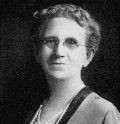In some of these cases, especially after the suppression has been caused by copaiva, the orchitis had been allowed to become chronic. Lycopodium promised to take care of all such abused and neglected cases where there were pains in the perineum upon sitting, urine profuse at night, scanty during the day and burns the parts over which is passes. A small amount of urine in the bladder causes pain in the back which is ameliorated after passing the urine, continued teasing to urinate, enlargement of the prostate, and white figwarts appear which are fissured.
So Pulsatilla told the story of her trials and so it was discovered that Lycopodium could almost always help her out of her difficulties and when he failed and both were “groping blindly in the darkness.” Others were waiting to do good these comprehended not. Always after that day when Pulsatilla went about healing the sick, she was followed by her good knight and true, the Northland rover, Lycopodium, and to this day, the legend tells us, they are at work for “the healing of the nations”.

